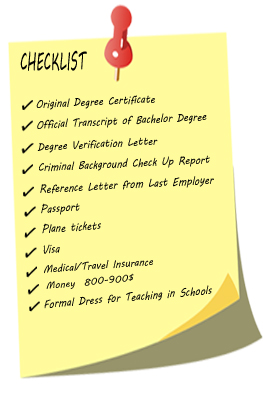BASIC CONTRACT OF TEFL
Basic Contract of TEFL / ESL / Teaching English Jobs in Thailand
A typical teaching job contract furnished by schools to the native-speaking teachers should contain:
Date of employment
Date of termination of employment
Place of employment
Teacher’s designation
Duties defined
Rate of remuneration, emoluments and accommodation
The normal hours of work and other terms and conditions relating to hours of work service and holiday entitlement
Terms and conditions relating to incapacity for work due to sickness or injury and sickness benefits if any.
Additional information regarding disciplinary measures
Employee’s probation period and process of confirmation and further entitlement to remuneration if service continued beyond probation
However, the contracts are not legally mandated for English teachers in Thailand, and those that are entered into are often broken by either the teachers or the schools because of policy changes or unrealistic expectations. The teacher should always translate a Thai contract into English to read thoroughly before signing the same.
Whether you sign a formal contract, be sure to ascertain the terms of your employment and negotiate for a fair deal before you agree to anything. Ask other teachers in your Thai community about features of teaching agreements, and use the following questions as guidelines in your search:
How many hours of teaching will you be guaranteed each week, and what will your rate of pay be?
Will the school provide assistance with a visa and work permit?
Is a flight stipend provided, either for air fare home when your commitment has ended or for you to renew or obtain your visa?
Does the school provide a housing allowance or a house on campus? Many of the more established schools in Thailand will provide one or the other. If your school is not willing to offer financial assistance, find out if they're willing to provide assistance in other ways, such as helping you to locate suitable housing at a fare price.
How many hours will you be expected to teach each day? Each week? And will you have to work on Saturdays?
Try to structure your schedule so that you will have enough time for yourself and for taking on private students if you should choose to do so.
Which classes will you be teaching, and will teaching materials be provided? Fly-by-night teaching operations rarely provide instructional materials as their chief interest is in making money, not in education.
Will you be allowed to take on private students in the hours that you are not working at the school? Relying on private tutoring as your sole means of income could be risky, but many teachers supplement their incomes this way as the rates for one-on-one tutoring are high.
Will you be allowed vacation time? If yes, find out if it is paid time off (not likely) and if you can take it at-will or only at particular scheduled times during the year.



 I heard great things about this TESOL course from 4 different people who went through it last year. I have always wanted to travel and teach, so this program was perfect for me.
I heard great things about this TESOL course from 4 different people who went through it last year. I have always wanted to travel and teach, so this program was perfect for me.  After looking at other programs in Thailand, I found ACT was offering the lowest price. Also, Kiersten and I came together and her friends had previously done the ACT program and they had nothing but good things to say about the program.
After looking at other programs in Thailand, I found ACT was offering the lowest price. Also, Kiersten and I came together and her friends had previously done the ACT program and they had nothing but good things to say about the program.  The ACT program seemed to be a great way to receive hands on training. It was a great learning experience. Sangeeta and Pak did a great job throughout and I was continually impressed with them and how professional the company was.
The ACT program seemed to be a great way to receive hands on training. It was a great learning experience. Sangeeta and Pak did a great job throughout and I was continually impressed with them and how professional the company was. 